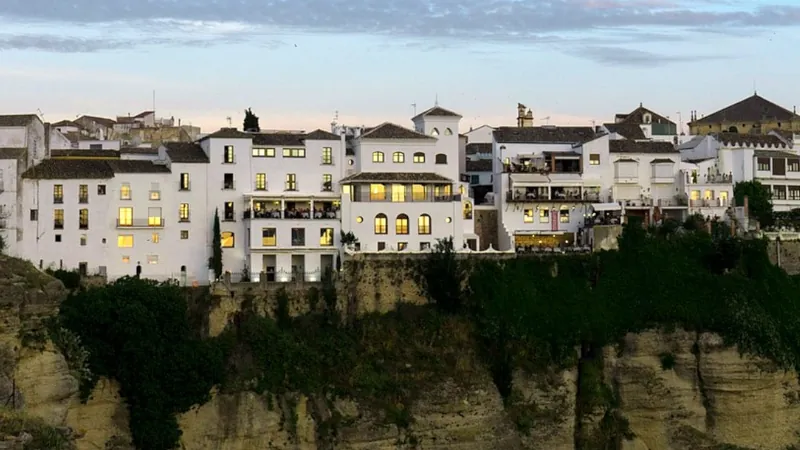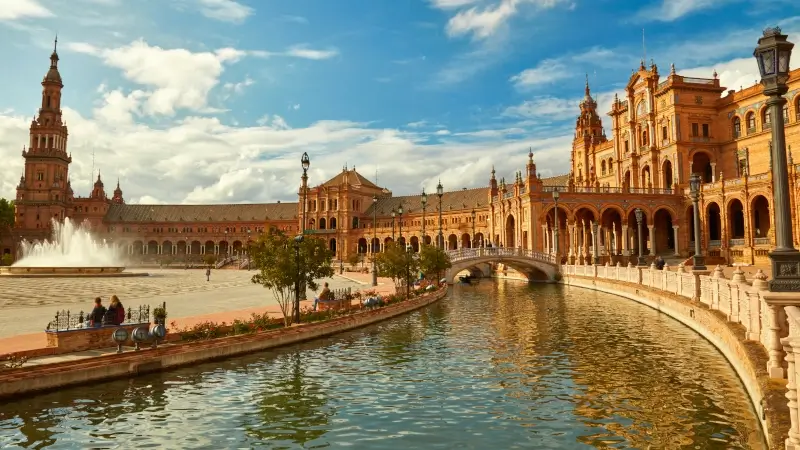Our #1 Pick For An Overseas Retirement
This year we once again crowned Valencia the #1 Best Place To Retire In The World in our Overseas Retirement...
Top Destinations:
Whether you’re looking for fun and sun, a peaceful retirement, or the chance to earn some extra income, you’ve got a real world of opportunity open to you… In short, we’ve done our best to narrow down your best options, but only you can decide the right country for you.
Best For:
How Much Will It Cost You To Live Overseas?
The only honest answer is, we have no idea. And neither does anyone else. The only one who can answer that question is you. Here’s the most important thing to understand about budgeting your new life overseas…
Follow Us:
Join our Weekly Newsletter
Overseas Property Alert
Sign up for our weekly newsletter to receive expert insights on the best international real estate investment opportunities.
Upcoming Events
International Property Summit
Caribbean Virtual Conference
Live and Invest In Spain Conference
PANAMA CITY, PANAMA
June 18-20, 2025
VIRTUAL
July 17-19, 2025
Valencia, Spain
Sep. 17-19, 2025
Contact Our Events Team
Reach us with your questions by email at: events@liveandinvestoverseas.com
Unlock The World
Overseas Havens Reports
Conference Kits
Lahardan Books
Our Customer Service team is here to assist with any questions or concerns CustomerService@LiveandInvestOverseas.com
Top Destinations:
Whether you’re looking for fun and sun, a peaceful retirement, or the chance to earn some extra income, you’ve got a real world of opportunity open to you… In short, we’ve done our best to narrow down your best options, but only you can decide the right country for you.
Best For:
How Much Will It Cost You To Live Overseas?
The only honest answer is, we have no idea. And neither does anyone else. The only one who can answer that question is you. Here’s the most important thing to understand about budgeting your new life overseas…
Follow Us:
Join our Weekly Newsletter
Overseas Property Alert
Sign up for our weekly newsletter to receive expert insights on the best international real estate investment opportunities.
Upcoming Events
International Property Summit
Caribbean Virtual Conference
Live and Invest In Spain Conference
PANAMA CITY, PANAMA
June 18-20, 2025
VIRTUAL
July 17-19, 2025
Valencia, Spain
Sep. 17-19, 2025
Contact Our Events Team
Reach us with your questions by email at: events@liveandinvestoverseas.com
Unlock The World
Overseas Havens Reports
Conference Kits
Lahardan Books
Our Customer Service team is here to assist with any questions or concerns CustomerService@LiveandInvestOverseas.com

We Value Your Privacy! We will not share your email address with anyone else, period.
Home » Best Countries To Live, Invest, And Retire Overseas » Europe » Moving To Spain : Everything You Need To Know In 2025

"For those seeking sunshine, opportunity, and a happily ever after in Old World Europe, Spain ticks all the boxes."
-Kathleen Peddicord, Founding Publisher of Live and Invest Overseas for forbes
Spain tops the list of the most popular destinations for relocating, investing, and retiring overseas. Some of the benefits of settling on Spanish soil are low living costs, affordable housing prices and First World infrastructure.
The country’s diversity—geographically and culturally—combined with its mild climate, rich history, and welcoming locals makes it an ideal choice for a fresh start overseas.
Boasting 3,000 hours of sunshine a year, Spain guarantees a sunshine-filled retirement. Temperatures are generally mild, although significant differences occur depending on the region and the season.
The south of Spain is known for its scorching temperatures in July and August, while the north of Spain is notorious for its high levels of rainfall throughout the year.
Spanish people are welcoming, and you will find it easy to settle in due to their openness and friendliness to foreigners. Language-wise, the majority speaks Spanish.

Reviewed By Kathleen Peddicord
Kathleen is the Live and Invest Overseas Founding Publisher. She has more than 30 years of hands-on experience traveling, living, and buying property around the world.



Start Your New Overseas Life Today
A world full of fun, adventure, and profit awaits! Sign up for our free daily e-letter, Overseas Opportunity Letter, and we’ll send you a FREE report on the 10 Best Places To Retire In Style Overseas Today 2024
We Value Your Privacy! We will not share your email address with anyone else, period.
You’ll find school-age and university students speak some English and are keen to practice. However, older generations don’t so much, unless they work in tourism-related industries, so learning some Spanish before you arrive would be a welcome idea.
Don’t worry about perfecting your Spanish, as you will find Spain is home to thriving expat communities in cities like Valencia, Alicante, Málaga, and Barcelona, where you’ll find language meetups, support networks, and even international schools.
Explore what life is like in Spain’s most popular expat cities.

“In Seville and Málaga, your budget could be as low as US$1,500 a month… and prices drop even more as you move inland.”
-Kathleen Peddicord, Founding Publisher Live and Invest Overseas
Spain’s affordable lifestyle is a big draw for many Americans thinking about making the move—especially retirees. Depending on where you settle, you might find that your monthly Social Security check goes a lot further here than it ever did back home. In some parts of the country, you can live quite comfortably—maybe even treat yourself more often—without needing a huge budget. It’s one of the few places where quality of life doesn’t have to come with a high price tag.
Yes—and no. Day-to-day expenses such as groceries, dining out, public transportation, and utilities are considerably cheaper than in most parts of the U.S. You’ll notice it right away: a loaf of fresh bread might cost less than €1, and a glass of wine in a local café could come with a complimentary tapa—think olives, manchego cheese, or a slice of tortilla española. This long-standing tapas culture means dining out can be a social and budget-friendly affair.
That said, your monthly budget will depend heavily on where in Spain you choose to live and how you spend your time. Big-city living costs more than life in the countryside or a smaller coastal town.
For a detailed breakdown—including average prices for rent, groceries, healthcare, and more—visit our full Cost of Living in Spain guide.
Spain’s economy is one of the key reasons the country remains so affordable for expats and retirees. As the fourth-largest economy in the Eurozone, Spain enjoys the benefits of a modern infrastructure, stable currency, and open European markets—while still maintaining a cost of living that’s far lower than in the United States.
Why the contrast? While Spain is economically developed, average local wages are lower than in the U.S., and unemployment—particularly among youth—has historically been high. This keeps everyday expenses like housing, groceries, and services at modest levels. For Americans living on Social Security or investment income, this translates into greater purchasing power and a more comfortable lifestyle.
Overall, Spain offers a unique balance—its economy is stable enough to support a modern European lifestyle, but local prices remain significantly below U.S. standards in most regions.
Let’s talk about taxes—because while daily expenses in Spain can be surprisingly low, the tax system is something to be aware of. If you plan to live in Spain more than half the year, you’ll likely be considered a tax resident, which means your worldwide income may be subject to Spanish tax laws. The rates are progressive, ranging from 19% to 47%, depending on what you earn.
It sounds steep, but it’s not the whole story. The taxes support strong public services—like healthcare and infrastructure—that expats tend to appreciate once they settle in. Still, it’s wise to talk with a cross-border tax expert before making any financial commitments.
Yes, many retirees do just that—especially outside of major metro areas.
Public health care In Spain is heavily subsidized. If you become a legal resident, you may qualify for low-cost or free healthcare (see our health care in Spain section).
In general, yes—though costs can be comparable depending on the region. Spain offers excellent value, especially when factoring in lifestyle.

One of the many perks of moving to Spain is access to a healthcare system that consistently ranks among the finest in Europe. The high quality is maintained across the board, from modern hospitals in major cities to local clinics in smaller towns. Spain’s healthcare is top-notch.
Spain operates a dual system: public care, which is government-funded and often free or low-cost for residents; and private care, which provides faster access and more flexibility, often at a cost that’s still far lower than what you’d pay in the U.S.
If you’re moving to Spain as a retiree from outside the EU, you won’t have automatic access to the public system. Instead, you’ll need to take out private health insurance to qualify for a residency visa—and maintain it throughout your stay.
The good news? Private insurance in Spain is surprisingly affordable. Depending on your age and the coverage you choose, comprehensive plans often start between €50 and €100 per month.
If you’re working or self-employed in Spain, you’ll pay into the social security system and gain access to the public health care network, including sickness and unemployment benefits.
Don’t underestimate Spain’s pharmacies (farmacias). They’re everywhere, and pharmacists are highly trained professionals who can offer direct advice and remedies—often for minor ailments that might require a prescription in the U.S. Many expats quickly come to rely on these neighborhood spots for quick, inexpensive care.
Many private hospitals in Spain have dedicated departments or programs for international patients that will help you access health care in Spain. This added support can be especially comforting if you’re still learning Spanish or prefer assistance during medical visits.

Planning on moving to Spain long-term? then the first piece of the puzzle is securing legal residency. The process is straightforward, but it does require some paperwork, patience, and preparation—especially for Americans who are not EU citizens.
Planning on moving to Spain long-term? then the first piece of the puzzle is securing legal residency. The process is straightforward, but it does require some paperwork, patience, and preparation—especially for Americans who are not EU citizens.
It all depends on your plans. Are you retiring? Working remotely? Starting a new chapter abroad? Spain offers several residency options to match different lifestyles:
As of April 3, 2025, Spain has discontinued its Golden Visa program, which previously granted residency through significant investments in real estate or other assets.
Each visa comes with its own set of requirements—such as private health insurance, background checks, and income requirements, What’s the best path for you? Our Spain Visa and Residency Guide walks you through every step.
In most cases, no, you’ll need to apply from your home country (or country of legal residence) before getting to Spain.
A regular Spanish visa application process can take from 1 to 3 months, depending on the visa type, your local consulate, and how complete your documentation is.
No, language skills aren’t required for most visa types. But speaking some Spanish makes the paperwork and everyday life easier.

“Spain welcomes foreign property buyers, and you can generally buy property without restriction.”
-Sophia Titley, Real Estate Editor, Live and Invest Overseas for Beaumont Enterprise
Spain offers a diverse and accessible real estate market, making it an attractive destination for retirees and expatriates. Whether you’re envisioning a coastal apartment, a countryside villa, or a city-center flat, Spain provides options to suit various lifestyles and budgets.
Spain encourages foreign investment in real estate, with no restrictions on non-residents purchasing property. Many expatriates choose to rent initially to explore different regions before committing to a purchase.
Foreign buyers must obtain a Foreigner Identification Number (NIE) to purchase property in Spain. It’s advisable to engage a local solicitor to navigate the legal processes, including due diligence, contract review, and tax obligations.
While property ownership doesn’t grant automatic residency, purchasing a property worth €500,000 or more previously qualified for the Golden Visa program. However, this program has been discontinued as of April 2025.
The NIE (Número de Identificación de Extranjero) is a tax identification number required for all financial transactions in Spain, including property purchases.
For a comprehensive guide on purchasing property in Spain, including region-specific insights and step-by-step assistance, visit our detailed Real Estate In Spain resource.

Spain has a unique adventure waiting for anyone who wants to immerse themselves in this cultural hub.
Cities with lively nightlife, beachside resorts with kilometers of unspoiled coastline, and picturesque towns and villages with bustling farmers’ markets—there’s a place for every lifestyle and budget.
Outside of Spain’s heavy tourist trail, is the lesser-known city of Santander. Santander is the capital city of the region of Cantabria and lies on the northern coast of Spain.
Built on a series of hills overlooking the Bay of Biscay, this is a mostly modern city with a beautiful seafront comprising several white-sand beaches within easy reach.
Santander is the perfect place for retirees, with endless museums and galleries to get your culture fix, a thriving tradition of gastronomy—mostly fresh seafood, and countless beaches to explore.
Another city undiscovered by many people outside of Spain is Valencia, along the Mediterranean coast. With an average daytime temperature of 70°F year-round, Valencia has some perfect weather conditions for an active, healthy, and varied lifestyle.
Combined with some of the finest beaches in Southern Europe, and La Calderona mountains in easy reach, this city is the ideal base for an active retirement.
Home of Spain’s most famous dish, paella, Valencia has a proud food culture to share with international residents.
Spain’s second-largest city; Barcelona, is a popular destination for tourists and expats alike. Thousands of expats settle in the capital of Catalonia in Spain’s northeast for its cosmopolitan vibe and energy.
People live, work, and shop in most of the city neighborhoods and districts, so each has its own community spirit, making it easier to fit into this big city as a foreigner.
The city encompasses lots of parks and charming plazas, scenic beaches, and has easy access to the beautiful Costa Brava to the north and the Costa Dorada to the south.
Located along Spain’s sunny southern coast, Málaga is one of the most popular destinations for expats moving to Spain—and for good reason.
With over 300 days of sunshine a year, long stretches of sandy beach, and a lively cultural scene, this port city offers an unbeatable quality of life on the Mediterranean.
Málaga is both historic and modern, with excellent infrastructure, a walkable city center, and a thriving expat community. It’s an ideal spot for retirees looking to enjoy a warm climate, great food, and a laid-back lifestyle by the sea.
Alicante, on Spain’s southeastern Mediterranean coast, is a long-time favorite among expats looking to retire in the sun.
This vibrant coastal city combines golden beaches, a bustling marina, and a charming old town with one of the country’s best climates—mild winters and hot, dry summers.
With affordable living costs, a relaxed pace, and excellent healthcare access, Alicante offers a balanced, comfortable lifestyle by the sea. It’s easy to see why so many have chosen to make this their new home.
Tucked away in the green hills of northern Spain, Oviedo is the elegant capital of Asturias—a region known for its natural beauty, cool climate, and rich cultural traditions.
Unlike the sun-soaked south, Oviedo offers a quieter, more temperate lifestyle with lush landscapes, historic charm, and a deep-rooted sense of community.
It’s a walkable city filled with parks, cafés, and medieval architecture, ideal for retirees seeking authenticity, affordability, and a slower pace of life.
Cádiz, located on a narrow slice of land along Spain’s southwestern coast, is one of Europe’s oldest cities—and one of its most enchanting.
Surrounded by water on nearly all sides, Cádiz offers a laid-back lifestyle, fresh Atlantic breezes, and easy access to long, golden beaches.
It’s a walkable, sun-drenched city with a rich cultural heritage, a strong sense of community, and affordable living—ideal for retirees craving history, charm, and coastal living all in one place.
Tucked between Bilbao and Santander on Spain’s northern coast, Castro Urdiales is a charming seaside town that offers a peaceful, small-town alternative to the country’s bigger cities.
With its picturesque harbor, Gothic church, and walkable old town, this hidden gem is perfect for retirees seeking natural beauty, historic charm, and a cooler coastal climate.
Life moves at a slower pace here, but you’re still just a short drive or train ride from major city amenities—making Castro Urdiales an appealing blend of quiet living and convenient access.
Nestled along Spain’s northern coast, Asturias is a region known for its lush landscapes, rugged coastline, and welcoming small towns.
With a mild, oceanic climate and a slower pace of life, Asturias appeals to retirees who want to enjoy green nature, fresh air, and authentic Spanish culture away from the crowds.
Whether you’re exploring charming villages or the regional capital, Oviedo, Asturias offers a peaceful and affordable lifestyle for those moving to Spain.

 Clear
Clear
The climate in Spain is Mediterranean. Plus, the country enjoys four seasons, though they are not extreme seasons.
The temperature in all areas of Spain typically ranges between 70°F and 90°F throughout the year.
Average annual humidity is around 80%.
Mountainous regions and any area above sea level may experience cooler temperatures and lower humidity. Spain receives little rainfall per year, most regions receive less than 25 inches of rain per year.
As in any country, weather depends on your region, but generally Spain enjoys a warm, stable climate, with little temperature fluctuation from season to season.
The best time to visit Spain would be spring (April-June) and early autumn (September-October). You’ll get pleasant temperatures and not to much rain. But, be aware that in July and August can be very warm and crowded in Spain because of the high season.
Spanish Winter: December to February
Spanish Summer: May to September
Spain has an average 3,000 annual sunshine hours. So, you can expect to enjoy the outdoor lifestyle most of the year…
The Andalucía region is the hottest part of all western Europe.
In Seville, daytime temperatures in winter rarely drop below 60 degrees. But, if you can’t stand the intense heat of high summer, cities like Málaga and Valencia provide a more comfortable climate.
However, if you want a taste of winter chill, you’ll find snow to the north in the Pyrenees, and south in the Sierra Nevada. Both provide skiing and snowboarding during winter months.

| Information Type | Spain (2025) |
|---|---|
| Population | 48,692,804 (as of April 2024) |
| Foreign-Born Residents | 19.32% of total population |
| GDP (PPP) | US$1.606 trillion (2024) |
| GDP Per Capita | US$34,045.17 (2024) |
| Inflation Rate | 2.9% (2024) |
| Currency | Euro (€) |
| Residency Processing Time | 1–3 months (Non-Lucrative Visa) |
| Healthcare System Ranking | 10th globally (Numbeo Health Care Index 2025) |
| Avg. 1BR Rent – City Center | €961/month (Madrid/Barcelona average) |
| Avg. 1BR Rent – Outside Center | €730/month (regional average) |
| Broadband Internet Speed | 245.6 Mbps (fixed broadband, Q1 2025) |
| Expat Satisfaction | 84% of expats report being satisfied with life in Spain |
| Climate | Mediterranean: hot, dry summers and mild, wet winters |
| Top Expat Cities | Valencia, Malaga, Barcelona, Alicante, Madrid |
| Life Expectancy | 83.3 years (one of the highest globally) |
| Official Language | Spanish (Castilian); regional languages include Catalan, Galician, Basque |
| Time Zone | Central European Time (CET, UTC+1); CEST in summer |
| Driving Side | Right |
| Emergency Number | 112 |
| Tap Water Safety | Safe to drink in most regions |
Click on any highlighted city or region to explore in-depth guides on what life is like there—from cost of living and climate to culture and real estate opportunities. Each location featured is one we’ve carefully reviewed and consider among the most livable and investment-friendly spots in Spain. Use this map as your starting point for discovering where in Spain your ideal lifestyle awaits.
“A huge advantage of living in Spain is the chance to explore Portugal, France, and beyond. Whether by road, rail, or air, Spain’s infrastructure allows you to plan your European adventures easily, frequently, and affordably.”
-Kathleen Peddicord, Founding Publisher Live and Invest Overseas.

With the dollar at near-parity with the euro, this could be the best time in our lifetimes to be in Europe.
Where, specifically, should you be thinking about living or retiring on the Continent?
Spain could be your Old World dream come true… especially if budget is a concern. You could live or retire well in this country on a budget of as little as US$1,855 per month.
Here are 10 more reasons we say Spain is tops:
Spain is the most popular second-home destination in Europe and home to some 7.2 million expats. Despite its popularity, the cost of housing remains cheaper than many of its neighbors.
In short, Spain and Portugal boast many of the same attractions. So, how do property prices compare between the two?
Luis da Silva, our go-to real estate expert in the region, says:
“When you compare like with like, real estate in Spain is really much cheaper. Thanks to Portugal’s limited housing stock and prices inflating in recent years, you get a lot more bang for your buck in Spain. And you have a much bigger variety of costas to choose from.”
Comparing like with like on the Atlantic coast, we find…
A two-bed townhouse in one of my favorite spots in Portugal’s Algarve for US$468,000…
Meanwhile, near the town of Cádiz on Spain’s Costa de la Luz, you can buy a similar townhouse at the beach for US$244,750.
That’s almost 50% less in Spain.
Portugal doesn’t have a Mediterranean coastline. So, in this case, let’s compare the costs in Spain with those over on the French Riviera… where, right now, you could buy a two-bedroom apartment in Nice, with sea views, for US$555,700.
Meantime, on the Costa del Sol, you can buy a similar two-bed apartment, second line to the beach with wide sea views, surrounded by beaches and golf courses, for US$229,875… almost 60% less!
From cosmopolitan cities and sun-kissed Mediterranean shores to romantic island escapes and mountain villages lost in time… modern Spain has 17 autonomous regions, each with its own personality and customs—and, sometimes, its own dialect.
Whichever region you decide to call home, you’ll never be stuck for new cultures to explore.
Want a vibrant city, full on Old-World charm, where there’s always something going on? Choose from Madrid, Barcelona, Valencia, Seville, and many more…
Prefer to live by the beach? Again, you have options aplenty… from the wild Atlantic coast to the calm shores of the Mediterranean… and from mainland to island…
Looking for a quieter life? Escape to lush Galicia where shepherds still roam the hills… and local bakers deliver their fresh loaves to your door, where you find them waiting for you when you wake.
If you’re hoping to escape the rat race once and for all, you’ll find Spain refreshing…
This is a true work-to-live society with an emphasis on time with family and friends.
Siesta culture is still strong. And holidays are many—with each region having colorful festivals throughout the year.
In many ways, life in Spain can feel like the America of the 1970s. People get dressed up… no matter how small the occasion. And you’ll often see three or four generations socializing together.
Retirees are respected here, too. Ivan, one of our local contacts in Cádiz, told us:
“Older people are very respected in Andalucía. They live their lives to the fullest until the very end. They still socialize in the plazas, play dominoes, babysit their grandkids at the beach, and do exercise classes together.
“This is especially true about older women from Andalucía. They are my inspiration for how to age with elegance. They still get dressed up, do their hair and makeup, go out with their friends to restaurants and cafés, and so on. And they are sassy!”
With an average 3,000 annual sunshine hours, you can expect to enjoy the outdoor lifestyle most of the year…
The Andalucía region is the hottest part of all western Europe. In Seville, daytime temperatures in winter rarely drop below 60 degrees. But, if you can’t stand the intense heat of high summer, cities like Málaga and Valencia provide a more comfortable climate.
However, if you want a taste of winter chill, you’ll find snow to the north in the Pyrenees, and south in the Sierra Nevada. Both provide skiing and snowboarding during winter months.
From its dramatic Atlantic shores to idyllic Mediterranean beaches, Spain has more than 3,000 miles of coastline… not forgetting its Balearic and Canary islands that attract everyone from the jet set to the budget traveler.
The Costa del Sol is home to the most stunning beaches, so it can be hard to get near one in high season…
But travel north to the Costa Brava or Costa Dorada… where the crowds begin to thin out… and you’ll find long, golden beaches lapped by the warm Mediterranean…
Spanish beaches are also clean and safe for swimming. The country holds the most blue flags of all European countries—and has done so since the awards began in 1987.
The Spanish health care system is one of the best in the world. It placed seventh in the most recent World Health Organization rankings.
As a North American retiree, you likely won’t have free access to the Spanish public health system. But there is a pay-in scheme of around US$65 a month for under-65s and US$170 a month for older residents. Meantime, private health insurance plans start from around US$300 a month.
And, if you need ongoing access to health care, you’ll be well catered for…
My friend Lucy who spent many years living in Barcelona says, “Barcelona has an enviable reputation for health care. There are well-trained doctors galore and many English-speaking ones from several different countries. Consultants in every specialty can be found throughout the city.”
Thanks to the rain up north and the Mediterranean climate down south, almost every fruit and vegetable grows here.
Valencian oranges are renowned as the best in the world… Galicia produces fine cheeses… the Mediterranean serves up the freshest seafood… and olive oil is a staple.
It’s no secret that the Mediterranean diet is a healthy one. For the fourth year running, it was voted the best diet in the world by U.S. News & World Report…
Living here, you could—without any real effort—eat your way into better health.
Best of all, eating out is extremely affordable. In some places, simple tapas come free with your glass of beer or wine… or pay a few dollars for a heartier dish.
Spaniards eat their main meal at 2 p.m., and you’ll find restaurants offering their three-course menú del día for lunch…
Expat in Valencia Mike Herndon says, “I’m single and I don’t cook at home. Why would I when I can enjoy a three-course lunch at one of my favorite restaurants for about US$10?”
And let’s not forget wine…
Spain, home to the most vineyards in the world, is also the second-largest wine exporter.
You can buy a good bottle in the supermarket for US$4 or US$5. When you feel like splashing out, you’ll find excellent wines for around US$10 to US$12.
If you’re looking for a rich culture, Spain is hard to beat.
For example, city-lovers will be spoiled with entertainment options in Madrid and Barcelona, both of which boast stunning architecture, countless museums and art galleries, theaters, cafés, and every kind of cuisine.
In Barcelona, recently named “the greatest city on Earth” by The Telegraph (UK), all you have to do is grab a seat at an outdoor café and soak up the atmosphere…
Most importantly, Andalucía is the birthplace of flamenco and there’s a particularly strong culture of this artform around Seville and Granada… though you can clap along to flamenco shows in all major cities, too.
A huge advantage of living in Spain is the chance to explore Portugal, France, and beyond.
Whether by road, rail, or air, Spain’s infrastructure allows you to plan your European adventures easily, frequently, and affordably.
From Seville, you can be in the Algarve in less than two hours by car… From Barcelona, it’s just over two hours to the French Riviera.
Fancy a long weekend in Amsterdam, Vienna, Rome, Prague, or Dublin? Budget airlines like Ryanair and EasyJet offer cheap flights all over Europe, with services close to all major towns.
If you’re hoping to find English-speaking friends in your new home—at least until you find your feet—you won’t be disappointed.
Madrid, Barcelona, and Valencia all have established expat communities where you’ll find plenty of native English speakers. The same is true of the Costa del Sol where Brits have been visiting and putting down roots for decades.
In short, if you want to make local friends—or get any business done outside of the main tourist areas—you’re going to have to learn to speak at least some Spanish.
The good news is that Spanish is one of the easier languages to learn… and the locals are very patient, encouraging, and forgiving while you’re trying.

Reviewed By Kathleen Peddicord
Kathleen is the Live and Invest Overseas Founding Publisher. She has more than 30 years of hands-on experience traveling, living, and buying property around the world.



Start Your New Overseas Life Today
A world full of fun, adventure, and profit awaits! Sign up for our free daily e-letter, Overseas Opportunity Letter, and we’ll send you a FREE report on the 10 Best Places To Retire In Style Overseas Today 2024
We Value Your Privacy! We will not share your email address with anyone else, period.
Spain is known for its food and markets, architecture, soccer, being the world’s first global empire and the only European country to have a physical border with an African nation. Also, Spain is one of the cultural centers of Europe, a place where the people celebrate life, and dance the flamenco.
Residency in Spain doesn’t just allow you to live in Spain. You can stay as long as you like in any of the 26 Schengen visa countries, meaning you could move as you wanted among Spain, France, Italy, Germany, Austria, Switzerland, and beyond.
All homeowners in Spain are required to have home insurance to protect their property’s value. While life insurance is not compulsory, many banks will ask borrowers to obtain life insurance that covers the remaining mortgage amount.
Yes, Spain and the United States have a double taxation treaty. Most importantly, U.S. citizens that spend more than 183 days a year in Spain are fiscally residents and will be taxed on worldwide assets.
Spain’s climate ranges from Mediterranean in the south to oceanic in the north. Whether you prefer sunny beach days or cool mountain air, you’ll find your ideal zone here. Read our full breakdown of Spain’s weather by region to help choose the right location for you.
This year we once again crowned Valencia the #1 Best Place To Retire In The World in our Overseas Retirement...
Sunny days, stunning beaches, happy people... A low cost of living, tons of cheap property, and tasty food... Healthy living,...
Considering a move to Spain? Here’s my list of things you need to know before taking the plunge… 1.Spain Offers...
Discover why Crete offers compelling value for investors with its booming tourism, affordable properties, and strong rental market. Perfect for...


We Value Your Privacy! We will not share your email address with anyone else, period.
As seen in

© 2008 – Live and Invest Overseas™ – All Rights Reserved.
Sign up to receive the FREE daily e-letter, Overseas Opportunity Letter and we’ll immediately email you our editors’ latest research report…
BEST PLACES TO RETIRE
FREE REPORT:
Sign up for FREE and learn how to live the good life on a modest budget, find bargain property, and more. Plus, check out our free report on the 10 BEST PLACES TO RETIRE.
RETIRE OVERSEAS AND LIVE LIKE ROYALTY
Top Countries
Budgets
Affordable
Resources
Real Estate
Overseas Property Alert
How To Become Independently Wealthy And Fund The Lifestyle Of Your Dreams
Buying Real Estate For Cashflow
Discover tips and strategies used by global property investing veterans
Explore Our Latest Posts
Learn how to invest and purchase property abroad…
Conferences
INTERNATIONAL PROPERTY SUMMIT
CARIBBEAN VIRTUAL CONFERENCE
Live and Invest In Spain Conference
Contact Our Events Team:
Toll-Free U.S. and Canada:
1 (888) 627 8834
From Outside North America:
1 (443) 599 1221
Working Hours
Monday – Friday 08:00 am – 17:00 pm EST.
Reach us with your questions by email at: events@liveandinvestoverseas.com
Store
Overseas Havens Reports
Conference Kits
Lahardan Books
Services
Free Report
THE 10 BEST PLACES TO RETIRE IN 2025

Sign up to receive the FREE daily e-letter, Overseas Opportunity Letter and we’ll immediately email you our editors’ latest research report…
We Value Your Privacy! We will not share your email address with anyone else, period.
Follow Us:
© 2008 - Live and Invest Overseas - All Rights Reserved.